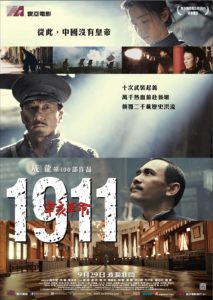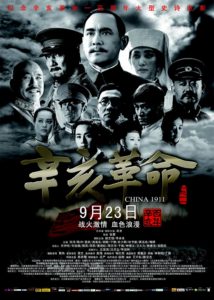1911
辛亥革命
China/Hong Kong, 2011, colour, 2.35:1, 120 mins.
Supervising director: Cheng Long 成龙 [Jackie Chan].
Director: Zhang Li 张黎.
Rating: 5/10.
Handsome but unengaging anniversary film about the founding of China’s first republic.
China, 1907. As she is led through the streets en route to her execution, revolutionary Qiu Jin (Ning Jing) dreams of a fairer China and recalls the struggle of the Tongmenghui (Chinese Revolutionary Alliance), led by Sun Zhongshan (Zhao Wenxuan), to end imperial rule by the Manchu Qing government. In late 1910 Sun Zhongshan – along with Tongmenghui colleagues including his deputy, the military-trained Huang Xing, aka Huang Keqiang (Cheng Long), and his partner Xu Zonghan (Li Bingbing) – meet in Malaysia to plan the Huanghuagang Uprising in Guangzhou. The uprising begins on on 27 April 1911 by attacking the Governor’s Office but fails due to lack of ammunition, leading to the deaths of 72 revolutionaries. On 10 October in Hubei province, the Wuchang Uprising, initiated by disaffected Qing officer Zhang Zhenwu (Fang Zuming), takes place and other provinces start to secede as a provisional government is formed in  Nanjing under Sun Zhongshan. Empress Dowager Longyu (Chen Chong) orders Qing commander-in-chief Yuan Shikai (Sun Chun) to suppress the uprising, leading to a series of bloody battles in central China. Yuan Shikai himself is dubious about the need for war as a means of further shoring up the failing Qing dynasty. In London, Sun Zhongshan persuades the key western powers to no longer agree to a £6 million loan to the Qing government. As the fighting rages on, revolutionary army leaders Huang Xing and Li Yuanhong (Jiang Wu) withdraw to the Yangtze River to gather their strength. Finally, after negotiations led by Tang Shaoyi (Xie Gang) and Wu Tingfang (Ye Daying), a republican form of government is agreed on, with 18 provinces declaring themselves in favour of democratic elections. To Yuan Shikai’s annoyance, Sun Zhongshan becomes the country’s first elected president; but to everyone’s surprise, Sun Zhongshan agrees to step down and hand over the position to Yuan Shikai if the latter can persuade the last Qing ruler, boy emperor Puyi, to abdicate.
Nanjing under Sun Zhongshan. Empress Dowager Longyu (Chen Chong) orders Qing commander-in-chief Yuan Shikai (Sun Chun) to suppress the uprising, leading to a series of bloody battles in central China. Yuan Shikai himself is dubious about the need for war as a means of further shoring up the failing Qing dynasty. In London, Sun Zhongshan persuades the key western powers to no longer agree to a £6 million loan to the Qing government. As the fighting rages on, revolutionary army leaders Huang Xing and Li Yuanhong (Jiang Wu) withdraw to the Yangtze River to gather their strength. Finally, after negotiations led by Tang Shaoyi (Xie Gang) and Wu Tingfang (Ye Daying), a republican form of government is agreed on, with 18 provinces declaring themselves in favour of democratic elections. To Yuan Shikai’s annoyance, Sun Zhongshan becomes the country’s first elected president; but to everyone’s surprise, Sun Zhongshan agrees to step down and hand over the position to Yuan Shikai if the latter can persuade the last Qing ruler, boy emperor Puyi, to abdicate.
REVIEW
Though it’s being billed as the 100th movie by Cheng Long 成龙 [Jackie Chan] – conveniently on the 100th anniversary of the so-called Xinhai Revolution 辛亥革命 which is its subject – 1911 辛亥革命 is little cause for celebration. The veteran Hong Kong megastar not only ends up looking like a supporting character in his own movie but also looks distinctly out of place in what is a routine, if superbly photographed, Mainland political drama stuffed with local actors.
Following the regular Chinese format for films dealing with major events and personalities, 1911 compresses some extremely complicated history into a string of short scenes, with characters who appear for a few minutes (or seconds) labelled with on-screen captions. Recent blockbusters The Founding of a Republic 建国大业 (2009) and Beginning of the Great Revival 建党伟业 (2011) reinvigorated this format by stuffing the cast with star cameos and turning the movies an ooh-look game for audiences. But each of those films had not only intelligent scripts but also two directors whose individual expertise (Han Sanping 韩三平 on the visual side, Huang Jianxin 黄建新 on the performance side) combined into a whole better than the parts. Though 1911 never looks less than impressive in widescreen, courtesy little-known d.p. Huang Wei 黄伟 (Promise 阿妹的诺言, 2007), and is decently scored and production designed, very few of the characters spring to life in the succinct way that Han and Huang managed in their two films.
With Cheng himself billed as “general director” and Zhang Li 张黎, a former d.p. and a director of TV drama series, credited as “director”, action scenes are competently staged but performances lack any kind of spark. That’s the fault not just of a bitty script, which never gets into political discussion along the lines of Beginning (which overlaps the same period), and what looks like considerable cutting during post-production; it’s also rooted in the acting itself, which never really breathes, even for short spells. More importantly, what should be a film about the relationship between Sun Zhongshan (played by Taiwan’s Zhao Wenxuan 赵文瑄 [Winston Chao]) and his militarist deputy, Huang Xing (played by Cheng), ends up as a movie about Sun with occasional appearances by Huang.
Though Cheng’s Huang has a fair amount of screen time, he never seems properly integrated into the film. And a brief hand-to-hand fight at the 80-minute mark – only there to remind the audience that they’re watching a Cheng Long film – seems completely out of whack for a character who spends most of the movie looking old, tired and depressed. As Huang’s later wife, Li Bingbing 李冰冰, whose brief scenes are all with Cheng, does her best in a sketchily written role in which she’s either playing a frontline nurse or caring partner. Among the other better-known names, Mainland actor Jiang Wu 姜武 shows up only briefly as an anti-Qing army officer, Cheng’s son Fang Zuming 房祖名 [Jaycee Chan] even more briefly in a similar role, and Mainland actress Ning Jing 宁静 in the opening scene as a well-known political martyr.
Zhao, looking pretty much like the real Sun Zhongshan (in contrast to most of the other actors in their roles), manages to give his character some kind of humanity beyond being a cardboard cut-out, and looks more relaxed here than is his norm. Among the supporting cast, Chen Chong 陈冲 [Joan Chen] has some fun as a hysterical Empress Dowager and Sun Chun 孙淳 is okay as Qing generalissimo Yuan Shikai (in the role played by Zhou Runfa 周润发 [Chow Yun-fat] in Beginning). But passing acting pleasures aren’t enough to sustain two hours: 1911 ends up as a good-looking but dramatically bitty movie that’s simply not very interesting to watch.
In China the film is also known under the English titles China 1911 (on posters) and 1911 Revolution (on prints).
CREDITS
Presented by Changchun Film Studio Group (CN), Shanghai Film Studio Group (CN), Beijing Alnair Culture & Media (CN), Jiangsu Broadcasting (CN), Jackie Chan International Cinema Cultural Holdings (CN), Xiaoxiang Film Studio (CN), China City Construction (CN), Hebei Film Studio (CN), Tianjin North Film Group (CN), Media Asia Films (HK), Huaxia Film Distribution (CN). Produced by Changchun Film Studio Group (CN), Shanghai Film Studio Group (CN), Hubei Provincial Party Committee Propaganda Department (CN), Beijing Alnair Culture & Media (CN), Jiangsu Broadcasting (CN), Jackie Chan International Cinema Cultural Holdings (CN), Xiaoxiang Film Studio (CN), China City Construction (CN), Hebei Broadcasting Film & TV (CN), Tianjin North Film Group (CN), Hillcas (Shanghai) Film (CN), Media Asia Films (HK), Huaxia Film Distribution (CN), Hebei Film Studio (CN), Nanjing Broadcasting (CN), Langfang Guohua Film Base (CN).
Script: Wang Xingdong, Chen Baoguang. Photography: Huang Wei. Editing: Yang Hongyu. Music: Lin Chaoyang, Ding Wei. Production design: Zhao Hai. Costume design: Chen Minzheng. Sound: Zhang Wen, An Wei. Action: Wu Gang. Special effects: Jiang Yanming, Zhuang Yan. Executive direction: Xie Shenghao, Wu Gang.
Cast: Cheng Long [Jackie Chan] (Huang Xing), Zhao Wenxuan [Winston Chao] (Sun Zhongshan/Sun Yat-sen), Li Bingbing (Xu Zonghan), Sun Chun (Yuan Shikai), Chen Chong [Joan Chen] (Empress Dowager Longyu), Jiang Wu (Li Yuanhong), Fang Zuming [Jaycee Chan] (Zhang Zhenwu), Hu Ge (Lin Juemin), Ning Jing (Qiu Jin), Yu Shaoqun (Wang Jingwei), Du Yuhang (Xiong Bingkun), Huang Zhizhong (Situ Meitang), Mei Ting (Chen Yiying), Xing Jiadong (Song Jiaoren), Hu Ming (Liao Zhongkai), Huo Qing (Tan Renfeng), Qi Dao (Wu Zhaolin), Tao Zeru (Tang Weiyong), Wang Ziwen (Tang Manrou), Ye Daying (Wu Tingfang), Chen Yiheng (Xu Shichang), Wei Zongwan (Yi Kuang), Tobgyal (Feng Guozhang), Xie Gang (Tang Shaoyi), Sun Jingji (Yu Peilun), Li Dongxue (Zai Feng), Zhang Xiaolin (Tieliang), Wang Ya’nan (Yuan Keding), Xu Wenguang (Zhang Mingqi), Jiang Jing (Yuan Shikai’s no. 1 concubine), Vivi Wang (Yuan Shikai’s no. 2 concubine), Wang Luyao (Yuan Shikai’s no. 3 concubine), Zhang Zhijian, Xi Meng, He Xiang, Lan Wuyu, Xu Ning, Wei Xiaojun, Qin Shi, He Qiang, Ma Yan, Qi Kui, Liu Zitian, Mai Ke, Gao Bin, Wang Wang, Zhao Yaodong, Jia Hongwei, Su Hanhua, Nan Kai, Tong Jun, Lv Yang, Tan Zengwei, Wang Kan, Zuo Zhaohe, Wang Jingfeng, Liu Guohua, Gai Jili, Ma Xiu, Can Wu, Du Luye, Simon Dutton.
Release: China, 23 Sep 2011; Hong Kong, 23 Sep 2011.
(Review originally published on Film Business Asia, 26 Sep 2011.)
